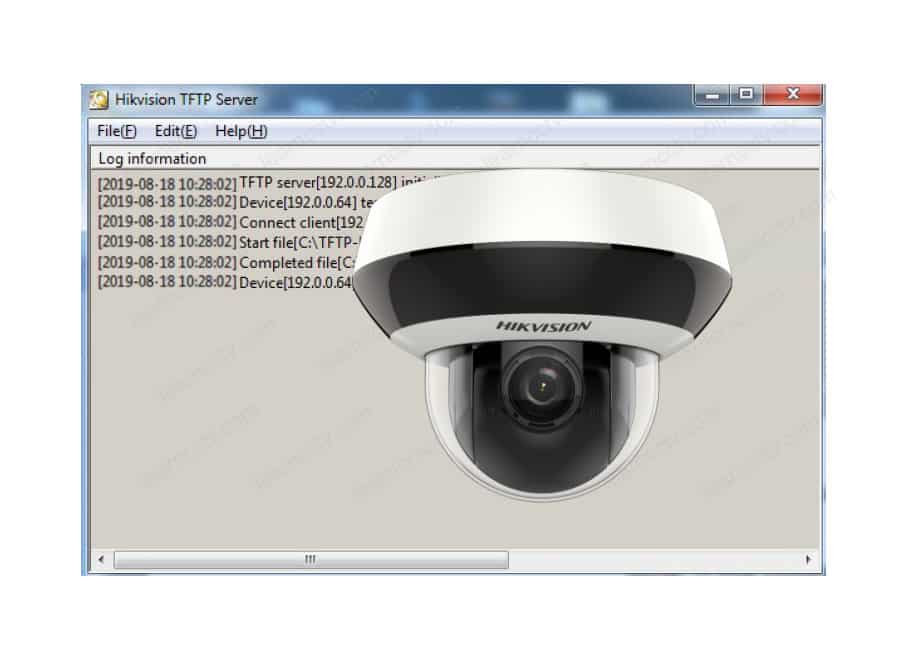In this article, I show how to recover a Hikvision camera using the TFTP method.
If you can't access the camera anymore because it's not responding, you need to use this procedure to recover it from a corrupted firmware.
This procedure is also known as "reflash the firmware" because it erases the memory and installs a new piece of software via simple computer commands.
How the reflash firmware procedure works
The Hikvision IP camera uses the default IP address 192.0.0.64 and has internal instructions to look for a TFTP server with the IP address 192.0.0.128.
To reflash the firmware on a Hikvision camera, you need to have both devices (camera and computer running the TFPT service) using those IP addresses.
The diagram below illustrated the concept.

Hikvision TFTP Server running on a local network
To recover your Hikvision IP camera, you need to install the TFTP server on the computer and change its IP to 198.0.0.128, so the camera can find it.
Let's take a look on the how to do that.
How to reflash the firmware on a Hikvision camera (via TFTP server)
Here's the step-by-step to reflash the firmware on a Hikvision camera.
- Download the TFTP server;
- Unzip the TFTP server to C:\TFTP-Auto-Update;
- Download the camera firmware from the Hikvision website;
- Copy the camera firmware file to C:\TFTP-Auto-Update;
- Add the extra IP 192.0.0.128 to the computer running the TFTP service;
- Turn on the Hikvision IP camera and wait for the automatic update.
The firmware from the Hikvision website works only with the camera sold by the authorized resellers; if you have an OEM camera, please contact the seller.
Let's take a look at the details on how to reflash the Hikvsion camera.
Get the TFTP server ready to work
Download the TFTP Server and unzip it on the C:\TFTP-Auto-Update folder.
Place the firmware into the TFTP folder
Note there's an extra file called digicap.dav in the folder C:\TFTP-Auto-Update.
This is the camera firmware file. You need to download the firmware from the Hikvision Website, unzip it and place it into this folder.
The picture below shows the Hikvision website where you can download the firmware from. Use the search box to look for the model you have.
Hikvision website - Download the camera firmware
Add an extra IP to your computer
You don't need to change the computer IP address.
I recommend you to keep the original IP and just add an extra one.
Windows allows you to do that; follow the steps below to do that.
Right-click the network icon and select " Open Network & Internet settings."
Click "Change adapter options."
Right-click the Interface that represents your connection to the network.
Click on "Properties."
Double-click the "Internet Protocol Version 4" or click "Properties."
Click "Advanced" to open the next window.
Click "Add..." to add an extra IP address.
Add the IP 192.0.0.128 with the subnet mask 255.255.255.0.
Save the configuration, and your computer will be ready to communicate with the camera, which will respond on the IP 192.0.0.64 (using mask 255.255.255.0)
Now it's time to run the TFTP server to reflash your camera.
Run the TFTP server
Double-click the tftpserv file.
The TFTP server starts running and looks for the camera in the network.
You may see the TFTP server running and communicating with the camera.
As you can see in the picture below, the TFTP server looks for the camera.
The connection is established the firmware is uploaded to the Hikvision camera.
And it's done.
Now you have your camera reflashed and working again.
Related articles
Here are some related articles that can help you.
Conclusion
Now you know show how to recover a Hikvision camera via TFTP.
The process is straightforward, you just need to add an extra IP address to your computer, install a TFPT server, download the firmware, and run the service.
There's no way to get it wrong, but if you need extra help, visit the Hikvision website.
I hope this article can help you; please share it your friends.
